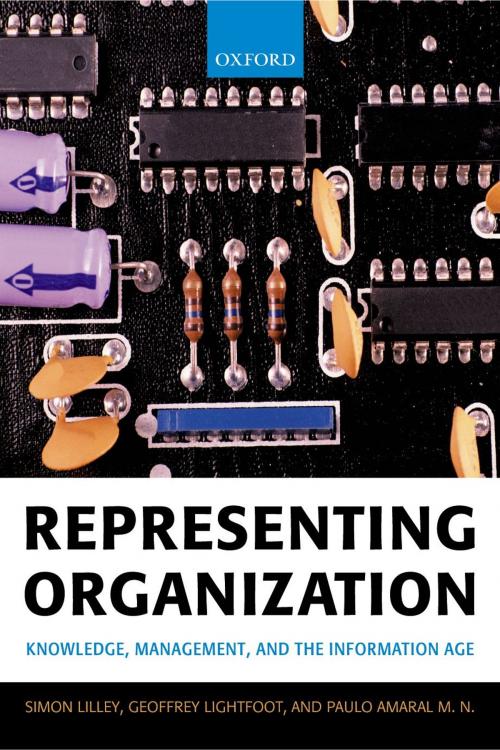Representing Organization
Knowledge, Management, and the Information Age
Business & Finance, Industries & Professions, Information Management, Nonfiction, Computers, General Computing| Author: | Simon Lilley, Geoffrey Lightfoot, Paulo Amaral M. N. | ISBN: | 9780191037122 |
| Publisher: | OUP Oxford | Publication: | June 17, 2004 |
| Imprint: | OUP Oxford | Language: | English |
| Author: | Simon Lilley, Geoffrey Lightfoot, Paulo Amaral M. N. |
| ISBN: | 9780191037122 |
| Publisher: | OUP Oxford |
| Publication: | June 17, 2004 |
| Imprint: | OUP Oxford |
| Language: | English |
This textbook provides an accessible theoretical analysis of the organizational impact of information technologies. It seeks to examine and comment upon the myriad ways in which actors, organizations, and environments are represented through these technologies. Contemporary threats to organizational form and stability are considered alongside the potential that information technologies offer to both exacerbate and overcome them. It examines, amongst others, issues surrounding the material and symbolic aspects of information systems; risk and prediction; systems implementation and systems success; knowledge management practices; accountability and other management practices; computerized modelling; and the virtual organization. To this end it deploys a number of different theoretical lenses including: · systems theory · social constructivism · labour process theory · post-structuralism · actor network theory These offer complementary and contrasting insights into the computerization of managerial work. In order to ensure that the book is both relevant and approachable to students from a range of backgrounds these theories are applied to real examples of the development and implementation of information systems. This combination fosters practical knowledge that is theoretically informed. The book thus aims to bridge the gap between the abstractions of current theories of organization and the grounded material that forms the bulk of Information Systems literature. It thus offers a novel way into the ongoing debates surrounding technological change and the perennial problems of managerial control. It has been designed to support theoretically informed Information and Technology courses at the advanced undergraduate and postgraduate levels, and will also be of interest to academics in the fields of Management, Information Technology, Sociological, and Cultural studies.
This textbook provides an accessible theoretical analysis of the organizational impact of information technologies. It seeks to examine and comment upon the myriad ways in which actors, organizations, and environments are represented through these technologies. Contemporary threats to organizational form and stability are considered alongside the potential that information technologies offer to both exacerbate and overcome them. It examines, amongst others, issues surrounding the material and symbolic aspects of information systems; risk and prediction; systems implementation and systems success; knowledge management practices; accountability and other management practices; computerized modelling; and the virtual organization. To this end it deploys a number of different theoretical lenses including: · systems theory · social constructivism · labour process theory · post-structuralism · actor network theory These offer complementary and contrasting insights into the computerization of managerial work. In order to ensure that the book is both relevant and approachable to students from a range of backgrounds these theories are applied to real examples of the development and implementation of information systems. This combination fosters practical knowledge that is theoretically informed. The book thus aims to bridge the gap between the abstractions of current theories of organization and the grounded material that forms the bulk of Information Systems literature. It thus offers a novel way into the ongoing debates surrounding technological change and the perennial problems of managerial control. It has been designed to support theoretically informed Information and Technology courses at the advanced undergraduate and postgraduate levels, and will also be of interest to academics in the fields of Management, Information Technology, Sociological, and Cultural studies.















